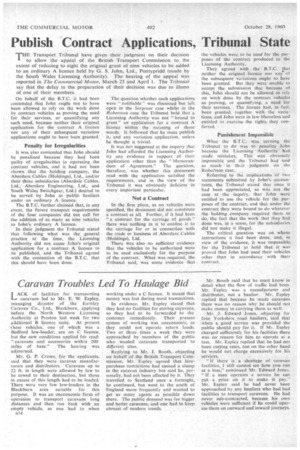Caravan Troubles Led To Haulage Bid
Page 68

If you've noticed an error in this article please click here to report it so we can fix it.
LACK -of facilities for transporting LA caravans led to Mr. E. W. Espley, managing . director of the Earnley Caravan •Co., Ltd., Blackburn, applying before the North Western Licensing Authority at Preston last week for two additional B licence units, At present. these vehicles, one of which was a Bedford low-loader,, are on C licence, but the new conditions applied for read: "caravans and accessories within 200 miles of base." The hearing was adjourned.
Mr. G. P. Crowe, for the applicants. said that they were caravan manufacturers and distributors. Caravans up to 22 ft. in length were allowed by law to be -towed to their destination, but those in excess of this length had to be loaded. 'There were very few low-loaders in the Blackburn area suitable for this purpose. It was an uneconomic form of, operation to transport caravans long distances and then run back with an empty vehicle, as one had to when
n34 working under a C licence. It meant thatmoney was lost during most transactions.
In evidence, Mr. Espley stated that they had no facilities for storing caravans. so they had to be forwarded to the customer immediately. Their present system of working Was uneconomic, as they could not operate return loads. Two or three times a week they were approached by members of the public who wanted caravans transported to different sites.
Replying to Mr. J. Booth, objecting on behalf of the British Transport Commission, Mr. Espley agreed that hirepurchase restrictions had caused a slump in the caravan industry but said he, personally, had not been affected by it. They travelled to Scotland once a fortnight, he continued, but went to the south of England more frequently and wanted to get as many agents as possible down there. The public demand was for bigger and better caravans, and one had to keep abreast of modern trends. 'Mr. Booth said that he must know in detail what the flow of traffic had .been. Mr. Espley was a manufacturer and disti-ibutor, not a haulier. Mr. Espley replied that because he made caravans there was no reason. why he should not make rilone}i in carrying. them as well.
.Mr. J. Edward Jones, objecting for four Yorkshire road hauliers, said that -when a good service was provided thepublic should pay for it. If Mr. Espley charged sUfficiently for his facilities there was no reason for him to operate at a loss. Mr. Espley replied that he had not been cutting rates, but on the other hand he would not charge excessively for his services.
"If there is a shortage of caravan facilities, I still cannot see how you run at a loss," continued Mr. Edward Jones.
If a man operates a service he can put a price on it to make it pay." Mr. Espley said he had never been approached by any hauliers who had had facilities to transport caravans. He had never sub-contracted, because his own vehicles were sufficient if he could operate them on outward and inward journeys.




















































































































